Ellis Shuman's Blog, page 28
October 8, 2018
Traveling in Southern Bulgaria: Bachkovo Monastery

The first thing one notices when walking into the Bachkovo Monastery – the third largest in Bulgaria – is a plaque posted in Bulgarian, English, and Hebrew.
"In this holy monastery lie Patriarch Kiril and Exarch Stefan who in a selfless display of courage and humanity played a decisive role in preventing the deportation of Bulgaria Jewry to the Nazi extermination camps in 1943."
"Were the world blessed with more individuals of such valor and nobility as that shown by Patriarch Kiril and Exarch Stefan, surely more Jews would have been spared their tragic end."
Here in the entranceway of one of the largest and oldest Eastern Orthodox monasteries in Europe is a sign of how the Bulgarian Orthodox Church – along with brave politicians and ordinary citizens – went out of its way to protect and save Bulgarian Jewry during World War 2. The country's Jewish population before the war was approximately 48,000. Not a single Jewish citizen was sent to the camps. Unfortunately this amazing story also has a tragic side. More than 11,000 Jewish residents of Macedonia, Serbia, and Thrace – areas under Bulgarian rule during the war years – were deported and died in the camps.
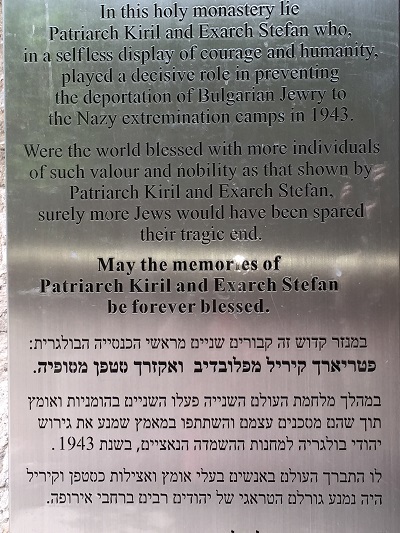
Not much else is Jewish in the Rhodopes – a mountainous range stretching from southern Bulgaria into northern Greece. My wife and I had arrived for a week's vacation in Bulgaria and the central Rhodopes were our destination for three days of exploration. We had lived and worked in Sofia – Bulgaria's capital – in 2009-2010 and had traveled extensively around the country, but one thing we had missed was a visit to these picturesque mountains.
Our first stop, just before we arrive at the Bachkovo Monastery, is the medieval mountaintop Asen's Fortress, named for Tsar Ivan Asen II who ruled the region from 1218 to 1241 during the Second Bulgarian Empire. Not much is left of the stronghold, built to repel advances of the Crusaders' Latin Empire; the fortress was captured twice, first by the Byzantines and then by the Ottoman Turks. The mountain site is more famous for the Church of the Holy Mother of God, which dates from the 12th-13th century. This remarkably well-preserved two-story structure, with its 14th century murals and cool interiors, is used today by the Bulgarian Orthodox church.
Bachkovo Monastery was originally founded in the year 1083 as a seminary for youth. Although it survived the Turkish invasion it was later looted and restored in the 15th century. The Cathedral Church of the Virgin Mary dates back to 1604. Across from the church is a colorful panorama mural depicting the history of the monastery; the painting is quite modern as it was completed in the mid-19th century.

After our visit to the monastery, we head south, the highway running along mountain streams and curving through thick green forests. We begin making our way steadily upwards into the Rhodope Mountains.
To be continued...
This is the first part of an article that was originally published in The Jerusalem Post.
Published on October 08, 2018 11:37
September 22, 2018
Review of The Parting Gift by Evan Fallenberg
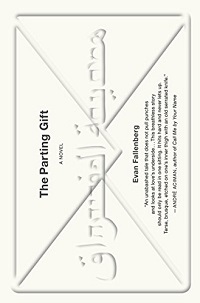 There’s a lot of sex in The Parting Gift by Evan Fallenberg (Other Press, September 4, 2018). Let’s start with that. Excessive, graphic, homoerotic sex which may turn off many readers. Now that we’ve got that out of the way, let us consider where this vividly described sexuality leads its narrator-protagonist—an unnamed Jewish American currently camped on his friend Adam’s couch after returning from an extended stay in Israel.
There’s a lot of sex in The Parting Gift by Evan Fallenberg (Other Press, September 4, 2018). Let’s start with that. Excessive, graphic, homoerotic sex which may turn off many readers. Now that we’ve got that out of the way, let us consider where this vividly described sexuality leads its narrator-protagonist—an unnamed Jewish American currently camped on his friend Adam’s couch after returning from an extended stay in Israel.In a book-length letter to Adam, the narrator offers a “long-overdue explanation of my mysterious appearance at your door these four months ago.”
The story the narrator tells starts at a Tel Aviv absorption center but veers in an unexpected direction after a visit to a nursery housing Israel’s most extensive collection of herbs and spices. There he meets Uzi, the spice guy.
“He was going about his business with no mind to me, while I was going about his business with no mind to myself,” the narrator explains. It is a case of lust at first sight. For the narrator, same-sex relations are nothing new but for Uzi, apparently, this greenhouse encounter is a first-time experience.
Along the way, the narrator meets Nina, Uzi’s ex-wife, who happens to live next door, as well as his three children. The eldest, Rinat, has an eating disorder of the type that can, unfortunately, accompany young troubled girls into adulthood. The narrator is privy to some of Rinat’s secrets but his friendship with the girl can’t prevent her from falling victim to the ugly side of sex addiction. And there is Ziad, the Palestinian day worker who will do anything, literally, to support his family.
The supporting cast of the story is described so realistically that we can easily picture what they look like and what they are thinking, but it’s the main character’s changing perspective on his relationship with Uzi that keeps us glued to the page. What started as love transforms into possessiveness and jealousy, and then ominously into a fatal attraction of obsession and explosive revenge.
We had been warned about the narrator’s character right from the start. He describes himself in his letter to Adam as “a man with a record in the crimes of love: Promises will be broken and vows will be trampled and feelings will be hurt—oh, far worse than that.”
But like Adam, as readers we must “assemble these facts ... lay them in their proper places, line them up until they are there and you can make sense of them.”
The ‘parting gift’ mentioned in the novel’s title has multiple meanings. It refers not only to the explanatory letter written to the narrator’s friend but also to the narrator’s departure from his partnership with ‘the spice guy’. And for us, the readers, The Parting Gift is a well-written, compelling novel with a bold narrative that explores the frailty of human relationships, same-sex and otherwise.
Evan Fallenberg is an American-born Israeli author and a translator of Hebrew books, plays and films. His work has won or been short-listed for numerous awards, including the American Library Association Barbara Gittings Stonewall Award for Literature, the Edmund White Award for Debut Fiction and the PEN Translation Prize. His previous novels were Light Fell and When We Dance on Water.
Fallenberg teaches at Bar-Ilan University in Tel Aviv and is faculty co-director of the Vermont College of Fine Arts International MFA in Creative Writing & Literary Translation. Fallenberg is the founder of Arabesque, a boutique hotel, situated in a restored and renovated Ottoman building in Acre, that serves as an arts and residency center.
Buy The Parting Gift and read it now!
Originally posted on The Times of Israel.
See also:
Review of When We Danced on Water
Published on September 22, 2018 21:24
September 12, 2018
A Visit to the Oldest Surviving Jewish Synagogue Building in Greece
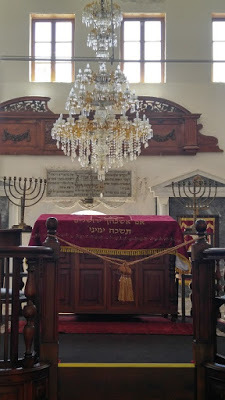 On a narrow alleyway off the main pedestrian thoroughfare in the Old Town of Rhodes, a set of steps leads up to an unpretentious doorway opening to a historic building and a small shaded courtyard. This is Kahal Shalom, the sole remaining synagogue on a Greek island which was once home to 4,000 Jews. Now serving as a museum, and only very occasionally for services, Kahal Shalom offers a welcome respite from the touristy hustle and bustle in the nearby streets, as well as a fascinating immersion into the story of one Greek Jewish community, its history and culture.
On a narrow alleyway off the main pedestrian thoroughfare in the Old Town of Rhodes, a set of steps leads up to an unpretentious doorway opening to a historic building and a small shaded courtyard. This is Kahal Shalom, the sole remaining synagogue on a Greek island which was once home to 4,000 Jews. Now serving as a museum, and only very occasionally for services, Kahal Shalom offers a welcome respite from the touristy hustle and bustle in the nearby streets, as well as a fascinating immersion into the story of one Greek Jewish community, its history and culture.My wife and I visited Kahal Shalom on our recent visit to Rhodes, a family trip which offered something suitable for all generations: beaches, a waterpark, shopping, a boat ride, an exploration of picturesque villages, good dining, nightclubs, and a fair amount of ouzo. On one day though, we left the children and grandchildren at the hotel pool and made an additional trip to the Old Town, with Kahal Shalom as the focus of our visit.
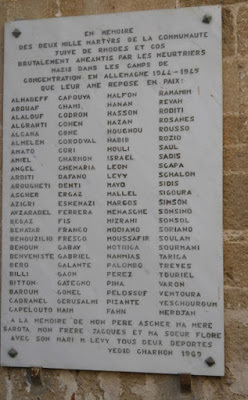 Although the Jewish presence in Rhodes dates back to ancient times, it grew significantly after the expulsion of Jews from Spain and members of the community spoke Ladino. A balcony for women was added to the Kahal Shalom synagogue in the 1930s, when the community was at its height.
Although the Jewish presence in Rhodes dates back to ancient times, it grew significantly after the expulsion of Jews from Spain and members of the community spoke Ladino. A balcony for women was added to the Kahal Shalom synagogue in the 1930s, when the community was at its height.After the island's Italian governor introduced anti-Jewish laws in September 1938, more than 2,000 Jews fled from Rhodes. The Germans occupied Rhodes in 1944, leading to the deportation of the remaining 1,673 Jews to Auschwitz. Only 150 survived. Near the synagogue’s entrance there is a plaque listing the family names of the Jews who lost their lives in the Holocaust.
The Rhodes Jewish Museum, established in 1997, exhibits photographs depicting life in the community, as well as explanations of Jewish culture and religious traditions. There are mannequins dressed in garments typically worn by the Jews of Rhodes, including a bridal gown. The story of Jewish life, and its tragic history during the Holocaust, is tastefully presented.
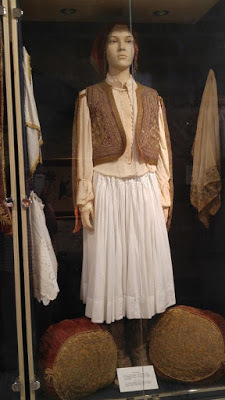 A visit to the museum will be educational for non-Jewish tourists, while Jewish visitors will be presented with a living memorial to the community that once played an important part in the island’s history. It’s hard to imagine that all the shops facing one of the Old Town’s main squares were once Jewish-owned businesses. Today there are only a handful of Jews living in Rhodes.
A visit to the museum will be educational for non-Jewish tourists, while Jewish visitors will be presented with a living memorial to the community that once played an important part in the island’s history. It’s hard to imagine that all the shops facing one of the Old Town’s main squares were once Jewish-owned businesses. Today there are only a handful of Jews living in Rhodes.My wife and I came away from our visit to the oldest surviving synagogue building in Greece and to the adjacent museum with a feeling that we had witnessed a living memorial to a once-vibrant Jewish community, a community whose history and culture should not be forgotten.
The Rhodes Jewish Museum and synagogue complex is open from 10am-3pm, April through November 1st. It is closed on Saturdays. During the winter months visits can be arranged in advance. The entrance fee is 4 euros.
For more information:
Rhodes Jewish Museum
Synagogues 360 Virtual Tour of Kahal Shalom
Jewish Community of Rhodes
Originally published on The Times of Israel.
Published on September 12, 2018 21:49
September 3, 2018
"Vivid imagery made me want to wander the streets of Bulgaria"

The book starts off with a brutal terrorist attack, which is based on a real terrorist attack that took place in July of 2012 at Burgas Airport. A bomb was placed and detonated on a bus, and the blast subsequently killed five Israelis and the Bulgarian bus driver. No one was ever held accountable for the attack or the deaths, which is unfortunately a tragic reality when it comes to terrorist attacks and also crimes in general. This means the loved ones who are left behind never get any closure let alone any kind of justice.
One of Shuman's strengths and indeed I would consider it a talent, is the way he describes the surroundings. The way he can evoke vivid imagery in the mind's eye of the reader. The reader sees and experiences Bulgaria through his words and emotional connection. It made me want to wander the streets and take in the history and architecture. Not every author can evoke that kind of response.
Read the rest of the review, as well as a Q&A session, on CherylM-M's Book Blog.
Published on September 03, 2018 22:36
August 27, 2018
Review of The Legacy by Melanie Phillips
 When we first meet British television producer Russell Woolfe, he is on his way to his father’s funeral. Sitting in synagogue “for the first time in forty years [he feels] hatred in his heart.” Woolfe “hated the synagogue for its rigid complacency. He hated his fellow Jews for making him despise them. He hated himself for having exposed himself to this irritation. Most of all, he hated his father for dying.”
When we first meet British television producer Russell Woolfe, he is on his way to his father’s funeral. Sitting in synagogue “for the first time in forty years [he feels] hatred in his heart.” Woolfe “hated the synagogue for its rigid complacency. He hated his fellow Jews for making him despise them. He hated himself for having exposed himself to this irritation. Most of all, he hated his father for dying.”Yet, for Woolfe, there was no question about going to the synagogue to “perform his duty as the son and say the kaddish, the prayer for the dead.” And this despite the fact that he was estranged from a father who had renounced him for marrying a non-Jewish woman.
In the novel The Legacy by Melanie Phillips (Bombardier Books, April 2018), Woolfe’s antipathy for his religion and the history of his people plays a key role in the story. Yet a chance meeting with Joe Kuchinsky, a Polish Holocaust survivor, sets Woolfe on a path of self-reflection, one that will possibly result in a new outlook on Judaism.
In parallel to following Eliachim’s fascinating history, Woolfe learns that Kuchinsky wasn’t completely honest when he assigned the translation task. This leads Woolfe to question how the manuscript came into Kuchinsky’s hands in the first place. Woolfe sets forth on a quest that takes him to Israel to meet with the second generation of Holocaust survivors.
The two tragic histories described in The Legacy—that of the Jews of York and the story of the Jews of Poland during the world war—make Woolfe wonder whether Jewish peoplehood is permitted in modern day Britain. This question is very pertinent today due to fears of rising antisemitism in the country.
In Woolfe’s reflections, at the narrative’s end, he must determine whether the hatred in his heart demonstrated in the novel’s opening pages can be replaced by acts of love, for both his father’s memory and “the ancient ancestry that [Woolfe] had so forcefully renounced.” As readers we come away with a growing sense that Woolfe will make the right choices how to deal with the legacy left to him by his ancestors.
Melanie Phillips is a British journalist, broadcaster and author. Her weekly column, which currently appears in The Times of London, has been published over the years in the Guardian, Observer, Sunday Times and Daily Mail. She is the author of Londonistan, the story of the British establishment's capitulation to Islamist aggression, and The World Turned Upside Down: The Global Battle over God, Truth and Power.
Buy The Legacy and read it now!
Published on August 27, 2018 22:07
August 8, 2018
Traveling to Rhodes with (Grand)children
When you think of traveling to the Greek islands you probably picture a sun-basked holiday of swimming in azure waters, lying on sunbeds for hours on end, and drinking ouzo at evening meals. While all that sun and all that ouzo might be the perfect vacation for adults, are there enough children-oriented options to keep the entire family satisfied?
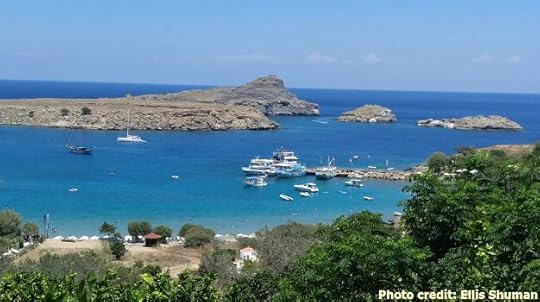 Lindos Bay
Lindos Bay
The island of Rhodes is the fourth largest in Greece and located in the Aegean Sea, 363 kilometers (226 miles) southeast of the Greek mainland. The southern coast of Turkey is easily visible from island’s northwest shore. Rhodes has a population of 120,000 which explodes with some 2 million visitors a year. The island’s vibrant tourism industry is evident by the ubiquitous traditional Greek taverns situated on nearly every corner of the island’s 40 towns and villages.
Keeping the children occupied is a major concern for families visiting Rhodes. On my recent visit we were a party of nine – six adults, two young children, and an infant. Our hotel - the wonderful Dionysos Hotel - had a lake-shaped swimming pool set in the midst of a lush garden. A pebble-covered beach was just a short walk away. But there is more to see on the island so we set forth, children in hand and a baby stroller following close behind.
 Rhodes Old Town
Rhodes Old Town
The Old Town of Rhodes is surrounded by medieval walls and filled with shop-lined narrow streets. While there were plenty of shopping opportunities tempting the adults, keeping the children at bay and happy was a bit of a challenge. A short evening stroll and an outdoor meal at a pleasant enough cafe made for a suitable family outing.
Speaking of dining one thing to consider is that service at the Greek taverns tends to be slow. In order to keep starving children quiet while their parents (and grandparents) wait anxiously for mouth-watering dishes of beef stifado, moussaka, and grilled seabream fish, we came to restaurants with snacks in hand.
Most of the island’s beaches are covered with pebbles, which children love to collect, but sandy stretches abound on the eastern coast. Particularly worth visiting is Tsambika. Its turquoise water and stunning scenery make it a favorite for relaxing as a family.

Tsambika Beach
If the waters of the Aegean are not enough, there’s always the Faliraki Waterpark. You can spend a whole day trying out the wave pool, bare-body waterslides, slides with mats, and extreme slides for the truly daring. The park has lockers and changing rooms, ample bathrooms, food and beverage stands, lifeguards, and a first aid station. There's even a train to help you get around. The park is a short ride from the city of Rhodes and a free bus service is provided.
There’s an additional way to explore Rhodes as a family, and that is to take a three-hour, 50-kilometer (31-mile) boat cruise down the coast to the village of Lindos. Located on a picturesque bay and complete with whitewashed buildings, the village welcomes tourists with its many souvenir shops and restaurants, and its beautiful beach. A three-hour stopover is sufficient for the steep ascent to the acropolis but it is possible to take in the views without paying the steep entry fees. Children will enjoy the donkey rides from the pier and back (9 euros one way, but you can negotiate for less).
No matter how much time parents, and grandparents, spend catering to the whims of their offspring, it is recommended to reserve some time for yourselves as well. There are nightclubs and bars catering to mature visitors and wandering through the Old Town without a youngster in hand makes for a completely different adult experience.
If you’re looking for a relaxing Greek island destination to enjoy as a family, you will not be disappointed with a visit to Rhodes. And there’s also the ouzo!
 Lindos Bay
Lindos BayThe island of Rhodes is the fourth largest in Greece and located in the Aegean Sea, 363 kilometers (226 miles) southeast of the Greek mainland. The southern coast of Turkey is easily visible from island’s northwest shore. Rhodes has a population of 120,000 which explodes with some 2 million visitors a year. The island’s vibrant tourism industry is evident by the ubiquitous traditional Greek taverns situated on nearly every corner of the island’s 40 towns and villages.
Keeping the children occupied is a major concern for families visiting Rhodes. On my recent visit we were a party of nine – six adults, two young children, and an infant. Our hotel - the wonderful Dionysos Hotel - had a lake-shaped swimming pool set in the midst of a lush garden. A pebble-covered beach was just a short walk away. But there is more to see on the island so we set forth, children in hand and a baby stroller following close behind.
 Rhodes Old Town
Rhodes Old TownThe Old Town of Rhodes is surrounded by medieval walls and filled with shop-lined narrow streets. While there were plenty of shopping opportunities tempting the adults, keeping the children at bay and happy was a bit of a challenge. A short evening stroll and an outdoor meal at a pleasant enough cafe made for a suitable family outing.
Speaking of dining one thing to consider is that service at the Greek taverns tends to be slow. In order to keep starving children quiet while their parents (and grandparents) wait anxiously for mouth-watering dishes of beef stifado, moussaka, and grilled seabream fish, we came to restaurants with snacks in hand.
Most of the island’s beaches are covered with pebbles, which children love to collect, but sandy stretches abound on the eastern coast. Particularly worth visiting is Tsambika. Its turquoise water and stunning scenery make it a favorite for relaxing as a family.

Tsambika Beach
If the waters of the Aegean are not enough, there’s always the Faliraki Waterpark. You can spend a whole day trying out the wave pool, bare-body waterslides, slides with mats, and extreme slides for the truly daring. The park has lockers and changing rooms, ample bathrooms, food and beverage stands, lifeguards, and a first aid station. There's even a train to help you get around. The park is a short ride from the city of Rhodes and a free bus service is provided.
There’s an additional way to explore Rhodes as a family, and that is to take a three-hour, 50-kilometer (31-mile) boat cruise down the coast to the village of Lindos. Located on a picturesque bay and complete with whitewashed buildings, the village welcomes tourists with its many souvenir shops and restaurants, and its beautiful beach. A three-hour stopover is sufficient for the steep ascent to the acropolis but it is possible to take in the views without paying the steep entry fees. Children will enjoy the donkey rides from the pier and back (9 euros one way, but you can negotiate for less).
No matter how much time parents, and grandparents, spend catering to the whims of their offspring, it is recommended to reserve some time for yourselves as well. There are nightclubs and bars catering to mature visitors and wandering through the Old Town without a youngster in hand makes for a completely different adult experience.
If you’re looking for a relaxing Greek island destination to enjoy as a family, you will not be disappointed with a visit to Rhodes. And there’s also the ouzo!
Published on August 08, 2018 22:13
July 10, 2018
Review of "Less" by Andrew Sean Greer
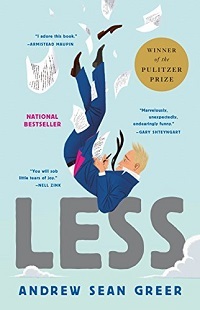 In the last few weeks I read two Pulitzer Prize-winning novels. I struggled through The Orphan Master's Son by Adam Johnson, which won the coveted Fiction Prize in 2013, but I smiled my way through Less by Andrew Sean Greer (Abacus, April 2018) which won the same prize for 2018. Two novels that couldn’t be more different. Both were recognized for their literary merit.
In the last few weeks I read two Pulitzer Prize-winning novels. I struggled through The Orphan Master's Son by Adam Johnson, which won the coveted Fiction Prize in 2013, but I smiled my way through Less by Andrew Sean Greer (Abacus, April 2018) which won the same prize for 2018. Two novels that couldn’t be more different. Both were recognized for their literary merit.I am not sure what the threshold is for Pulitzer Prize consideration or why one book wins while another remains on the shelf. I had chosen to read The Orphan Master’s Son because its setting is North Korea, and North Korea has been in the news lately. I chose to read Less because it’s the humorous tale of a failed novelist, about to turn fifty, who travels around the world to escape a failed relationship. That sounded just like the kind of book I would enjoy.
The Pulitzer Prize website describes Less as “a generous book, musical in its prose and expansive in its structure and range, about growing older and the essential nature of love.”
The novel's protagonist, Arthur Less, receives a wedding invitation in the mail. A former boyfriend (yes, this book concerns same-sex relationships) is engaged. Arthur has a dilemma, whether to attend the ceremony or not. It's much easier to escape by taking a round-the-world tour with stops at ill-conceived literary events.
A writing retreat in India turns out to be quite a different sort of retreat. A culinary assignment in Japan serves up the same dishes meal after meal. Less’s companions on a camel trek across the Sahara fall sick one after the other. There are mishaps and misunderstandings all along the way.
Just when you think the plot has taken a serious turn along comes an unexpected twist that brings yet another smile to your face. The peripatetic nature of the travelogue plot runs parallel to Less’s reflections of five decades of relationships and lost love.
Reviewers have described Less as "funny," "philosophical," "poignant," "heartfelt," "lyrical," "zesty" “bedazzling,” and "comic". My opinion in a word is that the book is "fun".
Andrew Sean Greer is the bestselling author of five works of fiction, including The Confessions of Max Tivoli, which was named a best book of 2004 by the San Francisco Chronicle and the Chicago Tribune. He is the recipient of the Northern California Book Award, the California Book Award, the New York Public Library Young Lions Award, the O Henry award for short fiction and fellowships from the National Endowment for the Arts and the New York Public Library. Greer lives in San Francisco. He has traveled to all of the locations in this novel, but he is only big in Italy. (Amazon author bio)
Published on July 10, 2018 22:03
July 7, 2018
Practical Tips for Visiting Sofia, Bulgaria

Regular visitors to my blog have heard me say time and time again why you should visit Bulgaria. But you might be wondering, how will you get around when you get there? If you plan to start your visit in Sofia, how will you get from the airport to the city center? If you rent a car, where should you park? If you want to plan a day trip out of the city, where should you go? Is Sofia a good destination if you're vegetarian or vegan? Is Sofia safe to visit?
Luckily all these answers and more are provided by Maria Stoyanova at her blog Travelling Buzz. If you're on your way to Sofia, I highly recommend her article:
"Sofia Travel Tips: What To Know Before Your Visit the Mysterious Bulgarian Capital"
Enjoy!
Published on July 07, 2018 00:58
June 12, 2018
The Satire of Alek Popov
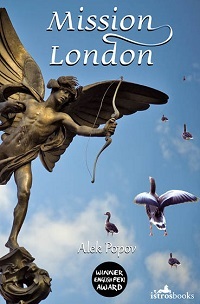 In the opening chapters of Mission London by Alek Popov (Istros Books, November 2014, translated by Daniella and Charles Gill de Mayol de Lupe), the staff of the Bulgaria’s UK Embassy awaits the arrival of the newly appointed ambassador. “They sat fidgeting ... beneath the map of Bulgaria, with its cold pink and yellow colouring. Malicious tongues had it that the map had been put there not so much to arouse patriotic spasms in the employees but to serve as a reminder of where they came from and where they could be returning if they were not sufficiently careful."
In the opening chapters of Mission London by Alek Popov (Istros Books, November 2014, translated by Daniella and Charles Gill de Mayol de Lupe), the staff of the Bulgaria’s UK Embassy awaits the arrival of the newly appointed ambassador. “They sat fidgeting ... beneath the map of Bulgaria, with its cold pink and yellow colouring. Malicious tongues had it that the map had been put there not so much to arouse patriotic spasms in the employees but to serve as a reminder of where they came from and where they could be returning if they were not sufficiently careful."Second Secretary Kishev, who had been in the UK for more than two years, “liked life on the island,” but Ambassador Varadin Dimitrov viewed his staff “as a gang of good-for-nothings, parasites living on the back of the state.” He felt he needed to "remind them that this job was not a winning lottery ticket.”
Mission London is a comedy of errors reminiscent of the British political satire sitcom “Yes Minister”. Based on Popov’s experiences as Bulgarian cultural attaché in London, Mission London has been widely acclaimed as "the funniest contemporary Bulgarian novel” for its sardonic portrayal of the Bulgarian diplomatic elite. The 2010 film that came in its wake was hugely popular in Bulgaria.
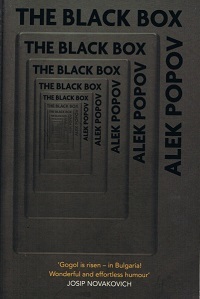 In Popov’s second novel
The Black Box
(Peter Owen Publishing, April 2016, translated by Daniella and Charles Gill de Mayol de Lupe), two Bulgarian brothers, Angel and Nedko, receive an unusual package from the United States – a black plastic box carrying the ashes of their father. Fifteen years later, that black box is still very much on their minds. Angel imagines his own ashes arriving on the threshold of his brother’s apartment in America while Nedko imagines his ashes being shipped to Angel’s home in Sofia.
In Popov’s second novel
The Black Box
(Peter Owen Publishing, April 2016, translated by Daniella and Charles Gill de Mayol de Lupe), two Bulgarian brothers, Angel and Nedko, receive an unusual package from the United States – a black plastic box carrying the ashes of their father. Fifteen years later, that black box is still very much on their minds. Angel imagines his own ashes arriving on the threshold of his brother’s apartment in America while Nedko imagines his ashes being shipped to Angel’s home in Sofia.Nedko sees himself as a “Successful Bulgarian Abroad, SBA” for his work as a consultant in a New York corporation. Angel, a failed book publisher, has remained in Sofia and belongs to the NSAB – “the Non-Successful Asses stuck in Bulgaria”. When Angel wins the Green Card Lottery he sets off to join his brother in America but in a comic twist, Nedko’s company sends him off to Bulgaria on business. While Nedko may be “an eminent representative of [the Bulgarian] diaspora in the States”, he is not a true member of CSB – the “Club of Successful Bulgarians.” The brothers may have changed places but their struggles to find their place in these fictional acronymic societies continue.
Things come to a head in a dog-eat-dog battle between two dog-walking trade unions and the dramatic rescue of Angel’s troubled girlfriend, who may or may not be a dog-walker herself. In the end there is also resolution to the mystery of the ashy contents of the black plastic box that started it all.
Mission London and The Black Box are both examples of wry, eastern European humor that will be appreciated by anyone who leaves a beloved homeland seeking a better life, whether temporarily or permanently. For all readers, Popov’s satirical novels give comical insight into Bulgaria’s efforts to transition from a communist state to a modern democracy.
Alek Popov is a Bulgarian novelist, dramatist, essayist, and short story writer. Born in Sofia in 1966, he has written in many different genres, including horror, erotic sci-fi, political satire, and adventure. His novel Mission London was first published in 2001 while his second novel, The Black Box, was first published in German in 2007. In a revised English edition, The Black Box won the 2013 Bulgarian novel contest of the Elizabeth Kostova Foundation and Peter Owen Publishers. Recipient of many other additional literary awards, Popov serves on the board of the Bulgarian PEN and is part of the editorial body of the literary magazine Granta Bulgaria.
Originally published on the Global Literature in Libraries Initiative website.
Published on June 12, 2018 22:23
June 4, 2018
In Appreciation of Bulgarian Literature

Ever since my return from Bulgaria in 2011 I have looked for ways to retain a connection to the country. In addition to using Bulgaria as the setting for my two suspense novels and writing travel articles encouraging tourists to visit, I have kept my eyes open for books that would refresh my memories of the two years I lived in Sofia.
My connection with Bulgaria led to my participation in Bulgarian Literature Month, organized by the Global Literature in Libraries Initiative, a website which “strives to raise the visibility of world literature for adults and children at the local, national and international levels.”
During the month of June, “readers will have the opportunity to get an overview regarding Bulgarian literature that is available in English translation.” International readers must take into consideration that very few books by Bulgarian authors have been translated into English. Bulgarian Literature Month, organized and curated by Thomas Hübner, enables English-speaking readers to at least get to “know ... the tip of the iceberg of Bulgarian literature.”
I chose as my topic the first two novels of Alek Popov, a Bulgarian novelist, dramatist, essayist, and short story writer. His novel Mission London was first published in 2001 while his second novel, The Black Box , was first published in 2007. Both books have been translated into English although Popov’s third novel, The Palaveevi Sisters (2013) has not yet been published in English translation. The common element of his first two novels is Popov’s wry, eastern European humor. Popov’s satirical writing gives comical insight into Bulgaria’s efforts to transition from a communist state to a modern democracy.
Read my article The Satire of Alek Popov on the Global Literature in Libraries Initiative website.
Published on June 04, 2018 10:24



